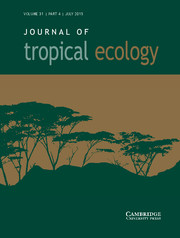Article contents
Memory and habituation to harmful and non-harmful stimuli in a field population of the sensitive plant, Mimosa pudica
Published online by Cambridge University Press: 20 December 2021
Abstract
Mimosa pudica is a Neotropical legume that closes its leaves rapidly in response to touch stimulation, hypothetically as herbivory defence. Habituation to non-harmful stimuli and long-term memory of past events have been demonstrated in this species, the former with relatively heavy objects and the latter under laboratory conditions. This species should not habituate to harmful stimuli if leaf movement is a response to herbivore damage. We tested in Monteverde, Costa Rica, whether (1) memory occurs in wild plants, (2) whether habituation occurs under harmful stimuli: simulated herbivory, and (3) whether wild plants can habituate to light non-harmful stimuli. The degree of closing of the leaflets and time until reopening was measured in response to repeated harmful and non-harmful stimuli. The results showed habituation to repeated non-harmful very light stimuli and showed lack of habituation to simulated leaf damage. Wild plants also showed faster rehabituation to repeated non-harmful stimuli when they had been exposed 15 days previously, suggesting possible long-term memory. These results indicate that wild plants are capable of (1) distinguishing between harmful and non-harmful stimuli (only habituating to the latter), (2) memorizing previous events, and 3) habituating very light tactile stimuli commonly experienced in the field.
Information
- Type
- Research Article
- Information
- Copyright
- © The Author(s), 2021. Published by Cambridge University Press
References
- 6
- Cited by


